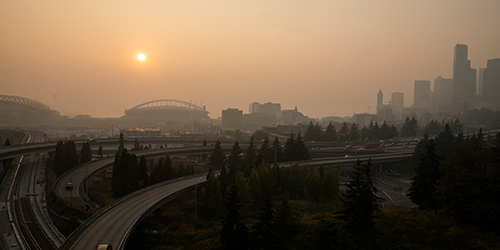Tips for dealing with poor air quality | PEMCO
 Most residents of Washington and Oregon are no strangers to poor air quality during the months of August, September, and October. In fact, most of us likely recall when two years ago, Seattle and Portland had the worst air quality in the world after a series of severe wildfires.
Most residents of Washington and Oregon are no strangers to poor air quality during the months of August, September, and October. In fact, most of us likely recall when two years ago, Seattle and Portland had the worst air quality in the world after a series of severe wildfires.
Even if there aren't wildfires or hazy skies near you, it’s still important to be equipped with the tools you need to deal with poor air quality. It’s not a matter to be taken lightly! Read on to learn how you can reduce your exposure to poor air quality and stay safe during the PNW’s hot, dry, and often smoky late summer months.
Why is Air Quality Index (AQI) and why does it matter?
AQI is a measure of how clean or polluted the air is. Poor air quality can have serious health effects, especially for people with respiratory or cardiovascular conditions, pregnant women, children, and older adults. One of the main factors that affects air quality in the Pacific Northwest is wildfire smoke.
Research over the last few years has demonstrated that air pollution patters are changing in the Western United States...and it’s not for the better. In fact, according to the American Lung Association, some counties in Washington and Oregon have an “F” rating for their number of days with unhealthy air quality.
How can I mitigate the impact of poor AQI and wildfire smoke?
It’s probably unlikely you can escape the effects of poor AQI and wildfire smoke completely (unless you leave the area), but you can take steps to minimize your exposure:
1. Wear an N95 or KN95 mask. Unlike a cloth or paper mask, they can filter out the most harmful particles in wildfire smoke, thanks to their tight-fitting design and layers of protection. They don’t give you a free pass to carry on as normal during poor air quality, however, since they can’t filter noxious gases you might encounter near a fire.
2. Keep doors and windows closed. Use your air conditioning if you have it but close the fresh air intake and replace the air filter more often. For added protection, use towels to seal cracks under doors and around windows. In your car, use recirculated rather than fresh air (it should be a setting on your dash). Once air quality improves, open windows to freshen your home, and change your car’s air filter.
3. Postpone certain chores. Believe it or not, vacuuming less often can make a difference. Vacuuming can stir up settled particles and send them floating back into the air, so it’s best to wait until the smoky conditions pass.
4. Invest in an air cleaner with a HEPA filter. The pleated filters capture and trap particles suspended in the air. When choosing an air cleaner, check its Clean Air Delivery Rating to make sure it’s the right size for your room and works to remove smoke. (If you’re buying a filter for your furnace or air conditioning system, always follow manufacturer’s recommendations.)
5. Check local air quality reports and visibility guides. That’s especially important if you’re thinking of taking a weekend getaway that could land you in a region with poor air quality.
How can I stay safe during bouts of extreme heat or drought?
Nearly half of the Pacific Northwest is currently experiencing drought conditions, according to the National Integrated Drought Information System. And in addition to reduced precipitation, the temps are soaring! High temperatures and dry conditions can cause far-reaching health effects (in addition to increased wildfire risk), so it’s important to keep safety top of mind when the highs reach sizzling heights.
This summer, stay hydrated, wear light and loose-fitting clothing, and seek share or air-conditioned places. For your home and property, follow these tips:
-
Close your windows and blinds during the day to block out the sun and keep the heat out. Open them at night when the temperature drops to let in the cooler air.
-
Use fans, air conditioners, or evaporative coolers to circulate and cool the air. Make sure to clean and replace the filters regularly and close the fresh air intake to prevent smoke from entering.
-
Avoid using the oven, stove, dishwasher, dryer, or other appliances that generate heat. Opt for cold meals, salads, or takeout instead.
-
Check your smoke alarms and carbon monoxide detectors to make sure they are working properly. Avoid burning candles, incense, or fireplaces that can increase the risk of fire and smoke.
-
Provide plenty of fresh water for your pets and avoid leaving them outside or in the car. If you have to leave them outside, make sure they have access to shade, water, and a cool surface to lie on.
-
Monitor your pets for signs of heat stress, such as panting, drooling, lethargy, vomiting, or collapse. If you notice any of these, contact your veterinarian immediately.
We hope you find these tips helpful and that you’re equipped with everything you need for a safe and healthy summer in the PNW. Why? So you can worry less and live more, of course!
Be on the lookout for future issues of Perspective as we will continue to share tips and tricks to help you protect what matters most.
Share on social media